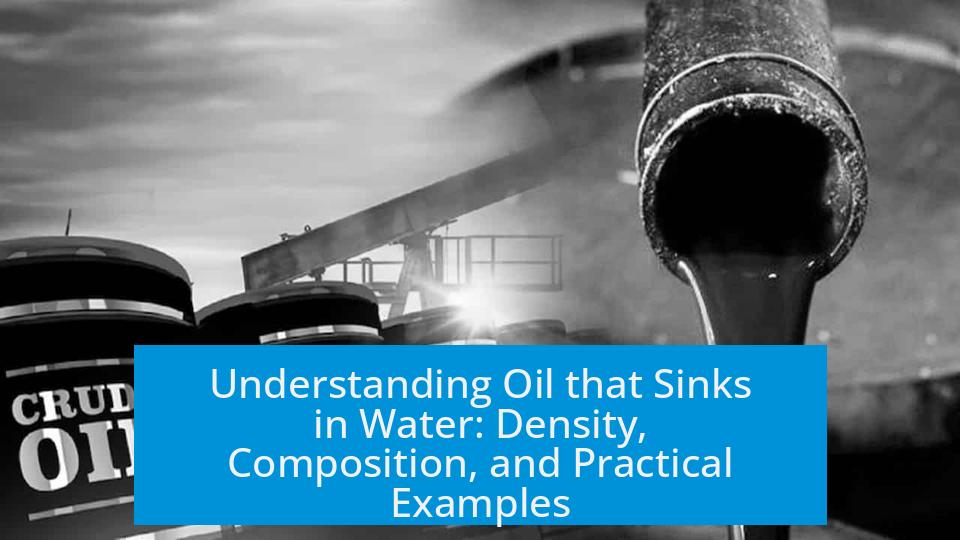Oil That Sinks in Water
Most oils float on water because their density is lower than water, but some oils sink due to higher density. This happens when the oil’s specific gravity exceeds 1.0, the density of water, causing it to sink instead of float.
Density and Specific Gravity
Density measures mass per volume and determines whether substances float or sink. Water has a density of about 1.0 g/mL. Oils typically have densities less than water, ranging from 0.7 to 0.9 g/mL, which makes them float.
However, certain oils like 1,3,3,5-Tetramethyl-1,1,5,5-tetraphenyltrisiloxane have higher densities (about 1.09 g/mL). Such oils sink because their specific gravity is greater than one.
Chemical Composition Impact
Heavier-than-water oils often contain halogens or fluorinated groups that increase molecular weight and density. For example, some halogenated solvents like dichloromethane are denser than water.
These are chemically distinct from typical hydrocarbon oils, which rarely exceed water’s density. Thus, not all hydrocarbons with density greater than water qualify as oils. Many heavier substances are classified as solvents, not oils.
Industrial and Practical Examples
- Diffusion pump oils such as Santovac5 are known for their high density and can sink in water.
- Some essential oils, especially those that contain heavier compounds or are steam distilled, can have densities near or above water, causing them to sink.
- Not all oil-water mixtures behave simply; contamination like water in oil sometimes changes density and buoyancy.
Distinguishing Factors
Definition matters: standard hydrocarbon oils almost always float. When oils sink, it is essential to revisit their chemical origins and check for halogenated or heavily fluorinated characteristics.
In summary, oil that sinks in water generally does so because its density or specific gravity exceeds that of water. This phenomenon is tied to chemical composition and molecular weight rather than typical hydrocarbon properties.
Key Takeaways
- Density greater than 1.0 causes oil to sink in water.
- Most common hydrocarbon oils have densities less than water and float.
- Halogenated or fluorinated oils and some specialty pump oils can sink due to higher density.
- Definition and chemical nature determine whether a dense hydrocarbon qualifies as oil.
- Practical examples include essential oils, diffusion pump oils, and halogenated solvents.
What causes some oils to sink in water?
Oils sink in water if they have a density greater than water’s 1.0 g/ml. Some specialized oils or chemical compounds, like certain siloxanes or fluorinated liquids, can be denser than water and thus sink.
Are all hydrocarbons lighter than water?
No, most hydrocarbon oils are lighter than water, but some hydrocarbons have densities greater than 1 and can sink. However, those heavier-than-water hydrocarbons are often not considered typical oils.
Can halogenated solvents behave like sinking oils?
Yes, halogenated solvents such as dichloromethane are heavier than water and sink. They differ chemically from petroleum oils but can show similar sinking behavior.
Is the sinking oil always a petroleum product?
Not necessarily. Many sinking oils or liquids are not petroleum-based. Heavier oils may be fluorinated or contain other elements making them distinct from standard petroleum oils.
What industrial examples exist of oils that sink in water?
Some diffusion pump oils like Santovac5 are denser and can sink. These oils are used in specialized equipment and are unlike typical surface oils.





Leave a Comment